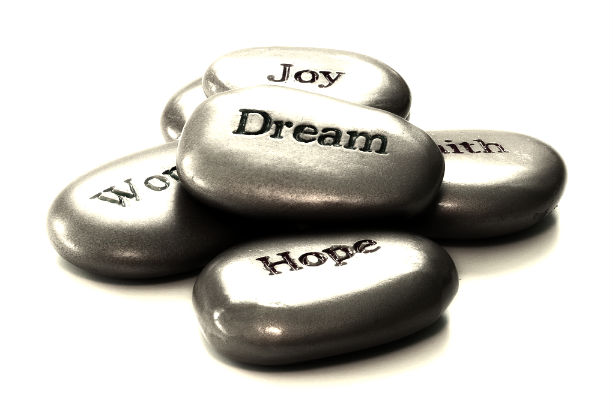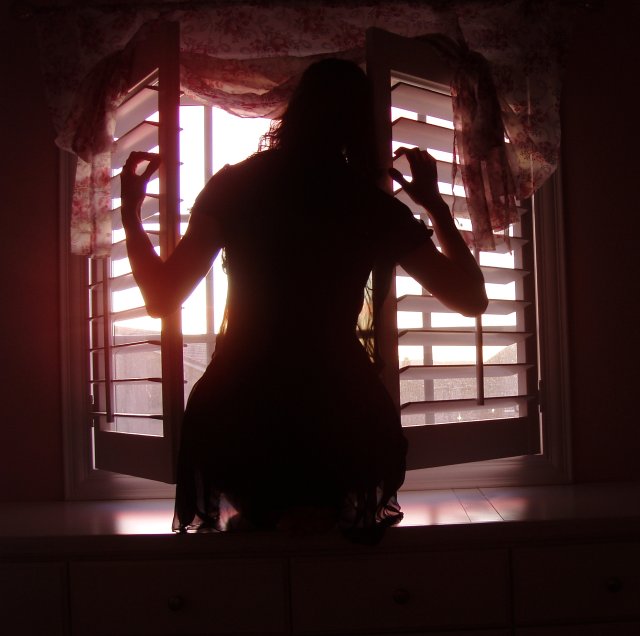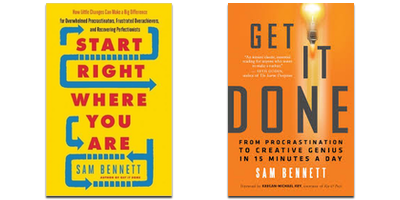
Dear Sam:
I have a question. The book that I want to write…I am wondering if it will be useful or if anyone would want to read it.
What do I do with this feeling of ‘who cares about your work, all the effort you put in is useless….’
If you could help I would be grateful.
Best,
A.
Dear A.,
Every single person throughout human history suffers from self-doubt, secretly believes they are a fraud and wonders if anyone will care about their work.
You are not alone.
In fact, your doubts may be part of what makes you an artist. I’ve heard it said that only dilettantes and amateurs never doubt their talent.
And I’ve noticed that the more daring the creative idea, the more vicious and violent those critical inner voices can become.
So over time, I’ve learned this:
the louder & meaner the voices in my head are, the greater the probability that I’ve just had a really juicy idea.
Think of it this way: the voices in your head are trying to keep you safe.
They don’t want you to put yourself in a vulnerable position.
They try to scare you into inaction by telling you that no one will care about your work. Or worse, that people will judge you harshly.
But art is about making yourself vulnerable.
That’s kind of the point.
Or at least part of the point.
And let’s face facts – it’s possible that you will create something that other people don’t care for.
Fear of failure is entirely reasonable. But it’s no reason not to do your work.
As long as your work remains unwritten in your head, it has no effect on anyone.
Except you. And then not in a good way.
Once you let your idea out of the hermetically sealed vault of your brain and out into the fresh air, the idea will immediately start to evolve. The minute you get it down on a piece of paper, it will change.
And then, once you let it out of the house – once someone else gets to experience it – then you are all changed.
You are changed.
The project is changed.
The audience is changed.
That’s the alchemy of art.
And here’s a real-life example:
Nedi, a vivacious member of my 365 Club, worked with her son to compose a song about Autism.
She finally got the courage to get it mastered, and she posted it online.
She started getting emails and responses – including one from Kate Winslet’s Golden Hat foundation (http://www.goldenhatfoundation.org/) and then she created a Kickstarter Project to move the project into its next phase: http://kck.st/NBCsLo
Here’s what Nedi herself said:
Before three weeks ago, I thought to myself “Who cares if I do my 15 minutes?”
But THEN a little voice said to me, “Samantha would care.”
So, on the off chance that the voice was right, and to keep myself on track: I will tell you that I completed 30 min. the first week, 60 the next, and since yesterday’s call – 90 min!
Much Gratitude and Affection,
NEDI
Inspiring, right?
Those critical voices will always be with you. I’ve never met an artist who didn’t struggle against them. Me included.
It’s up to you to decide if they get to run the show.
I can’t guarantee you that getting your work out there will always lead to success.
I can guarantee you that not getting your work out there will always lead to feelings of failure.
If you would like a very inexpensive way to get some additional encouragement and support, you might enjoy participating in the extremely groovy membership club I’ve started — we’re having a blast!
Please let me know how it goes for you.
Remember: The World Needs Your Art.

Maybe you are in the middle of a dry spell so severe your lips are parched.
I’m sorry. I know that feeling — that sinking, empty, aching feeling — and I wouldn’t wish it on anyone.
But I know that eventually it will end. And you will live through it. I’m sorry I can’t say how long “eventually” will be, but I do know that you will get your mojo back.
You are an artist.
And sometimes artists endure extended periods during which it seems as if nothing’s happening.
It ’s called acedia, meaning “spiritual torpor and apathy; ennui” or “anomie in societies or individuals, a condition of instability resulting from a breakdown of standards and values or from a lack of purpose or ideals.”
And it doesn’t mean you’re dead inside.
It just means that you’ve temporarily lost the ability to feel joy in your work. Which is sad.
But if you accept this dry spell as a stage in the artistic process, feeling fully confident that no one and nothing can ever take away your identity as an artist (after all, they haven’t been able to make it go away yet, have they?), you just might survive.
Maybe this is the time to pursue some of those other things you always say you want to do. Volunteer more. Have lunch with friends.
Take a temporary job in a field that ’s of interest to you. Spend more time with children. Read all those books you’ve got piled up. Plan a trip. Sit on the couch with the television off.
Whatever happens, don’t give up on yourself.
Eventually you will get a little tickle. An idea will whisper to you. You’ll catch yourself thinking, “I wonder if . . .” and you’ll be off to the races again, productive, happy, and rejoicing in the renewal of your vibrant, creative voice.

Disappointment is, literally, failing to keep an appointment. Which is why I think it hurts a little more than the other bumps and bruises of life.
When you feel disappointed, you are feeling deprived of something you thought was already in motion. If you’re feeling like you have an “appointment” with a promotion or a successful presentation or a new love, having that thing not work out is especially crushing because it was kind of a done deal inside your mind.
And that old saw about “don’t get your hopes up, and that way you won’t get disappointed,” is the biggest bunch of hooey I’ve ever heard.
First of all, it’s a bad strategy because it plain doesn’t.
If something you want doesn’t work out, you’re going to be bummed whether or not you had anticipated the failure.
And missing an opportunity to have delightfully high hopes seems. . . churlish.
I understand the impulse to say, “I just don’t want to get hurt again.” But guess what? You’re here to get hurt.
We’re here to try again. and again. and again. We’re here to gain resiliency.
So I say go ahead — get your hopes up. Dream big, lush, vivid dreams. Imagine your ideal of success with the full knowledge that reality may never measure up.
Then when things do work out, you haven’t wasted one moment tamping down your enthusiasm. And if they don’t work out, well, then, you are free to feel the full force of your disappointment. Which may or may not be as bad as you had imagined it might be.
I bet that if you stacked up all your disappointments you would you would find that very few of them make you think, “Oh, I wish I hadn’t even tried that.” I bet you would mostly think, “Well, I sure learned a lot.”
And that’s the other thing we’re here for: our soul’s education.
Nevertheless, disappointments can leave deep scars. And some disappointments take longer to heal than we’d like, even when we know we “should be over it by now.”
(Over it by now? Says who? What is this mysterious global time frame on getting over things? Honestly.)
Disappointment is a wise and valuable teacher. It acquaints you with grief. Grief, said the Greeks, is the daughter of anger and sadness. These two powerful emotions need to be felt, explored, and lived through.
Otherwise we are only a living shadow of our true selves: pretending we don’t care about the things we care about most.
So there’s a time to cry and a time to stop crying.
photo credit: A.K. Photography via photopin cc

And as you stand there
Hands clasped in front of you
Eyes downcast
Concealing the disobedient pounding of your heart
It dawns on you:
Here we go again.
And while you no longer allow yourself the long, elaborate
daydreams in which everything works out perfectly,
You catch yourself thinking: Well, it could happen.
And though you have long since given up making bargains
with God,
You find yourself whispering: Please.
And since you have — years ago — quit telling
Anyone anything about anything
Because honestly,
The things people say, such as,
“Oh, it will happen for you, I just know it!”
Really?
“I have a friend who went through the same thing and then one
day, just like magic. . .”
Really?
“The minute you stop wanting it, that’s when it will happen.”
Oh. Okay.
So you haven’t told a soul.
Except, after long consideration, your very dearest best friend.
And you know the odds are against you.
And still
You know that life is not a numbers game and
The Lord does, indeed, move in some very mysterious ways and
Haven’t you earned —
And there you stop short.
Because life is also not about earning or deserving,
And it doesn’t matter how hard you’ve tried or how much you’ve
sacrificed or how positive your positive mental attitude has
been.
What matters is reality.
And reality says: It’s possible.
So you dwell in possibility.
Between the dark and the daylight.
No longer storming off, slamming doors, and swearing, “Never
again.”
No longer crying out in agony because you had been so sure this
was It.
No longer elated by another promising sign.
You are here now.
Committed to enjoying the ride.
Trusting in the friendliness of the universe.
Awakened to your heart’s desire.
Knowing that there is no such thing as false hope.
All hope is real.
Real. Hope. Now.
It’s all we have.
And who knows?
Perhaps the best really is
Yet to come.
We all get disappointed sometimes. And mostly we follow a pretty simple process of feeling tremendously upset, thinking about it way too much, then finding some way to comfort ourselves and then moving on. With the help of some friends, some carb-heavy comfort food (or herb tea or martinis or double-chocolate
fudge crunch ice cream or whatever your narcotic of choice may be…) and perhaps a period of true unbridled wallowing, we get over it.
Mostly.
But some disappointments linger. Some become a permanent part of our internal landscape. Some even feel as though they have become part of our identity, and we almost can’t imagine letting them go, even though they cause us so much pain.
Here’s the good news: you’re reading this.
That tells me that you:
- Actually WANT to get over it
- Can at least sort of imagine that you COULD get over it
Welcome to Bouncing Back from Disappointment: Three Strategies to Really Get Over It.
I hope we’re going to make some good progress
here – I can’t guarantee anything, but I have seen people make some miraculous shifts in very brief amounts of time, so I
wouldn’t rule anything out. Now, it’s not possible to “unthink” something, and you can’t not feel the way you feel
about something. There’s no magic pill.
But you can
unscrew the bolts a little bit on the ideas that are keeping the experience both fixed and
painful.
(One possible exception: Grief. My
experience is that other kinds of pain and disappointment can shift and move
but grief – even old grief – just sweeps up on you and feels for all the world like it just happened this morning. So I want you to be working on a specific
frustration or disappointment or failure here, and I want you to pick one, but
if it’s a Grief, then maybe, just for the purposes of today, pick another, less
knotty one.)
Everybody have one particular disappointment in mind? Good.
Maybe it’s just a little one: I over salted the
turkey meatloaf the other night and I’m a little disappointed in myself.
Or a medium one: I’m still so bummed I
never finished college, or that we got outbid on that house.
Or a big one: I got fired.
Or a really big one: I still can’t
believe he or she had that affair.
Now, let’s get a
reading here:
On a scale of 1-5, how disappointed are you about your
thing?
1 = Actually, I’m mostly
over it
2 = Still stings a bit
3 = This causes me some pain when I think about it
4 = Ouch! Ouch! Ouch!!!!!!!
5 = I almost can’t imagine EVER being over this
Are you at a 1, 2, 3, 4 or 5? Whatever it is, just guesstimate and write
down the number.
It’s important that you be honest with yourself about your level of disappointment.
Sometimes we can get caught up in Enforced Optimism (“Oh, it’s all good…”) or Depressive Diminishment (“It’s no big deal”) and I don’t want that. I want you to haul the monsters out from under the bed and look them in the eye. Be straight with yourself. There’s no sense pretending that you feel all yippee-skippy when you don’t, and there’s no sense hanging on to a disappointment from which, you discover, you are really mostly already recovered.
STEP ONE: We Are Not Amused (but maybe we could be…)
So the first thing I want you
to do is give this event a new, more disastrous name. Really exaggerate. Unleash your Inner Drama Queen. Go for it. Write it down.
“I blew the presentation,” could be
re-named “I’m Headed For The Poorhouse For Sure!!!”
“I fell off my diet,” becomes “I Am
The Walrus, Koo Koo Ka Choo”
“I didn’t finish my novel,” becomes “I Will Never Be A Real Writer Ever Ever Ever Ever Ever”
Got it?
Be melodramatic. Make yourself laugh.
(It’s great if you can do this with a trusted friend who can laugh with you.)
How does it feel to give it this extreme name? What do you notice? What shifts?
Next, I want you to write down a really minimizing name for your event. Brush it off. Spin it like a crooked politician. Or imagine you have an eccentric great-aunt who hears about your disappointment and just waves it away with a word. What does she call it?
“Nobody’s buying my product,” becomes “Well, This Has Been Some Fascinating Market Research…”
“I’ll never get another date,” becomes “Oh, Pish Posh, Silly Old Dating, Who Cares?”
“I’m chronically disorganized,” becomes “I Am So Creative With Where I Put Things!”
Again, write them down and notice how each one feels. (Don’t worry – you can always go back to the same way you’ve always felt. No pressure.)
We’re
just experimenting with perspectives here, so you don’t need to actually believe your new names for this event, but you do need to acknowledge that there may be some alternatives to the lonely, empty feeling you’ve allowed the memory of this event to trigger in you.
If you like this Step, then keep going:
– What would your dearest, best friend call this event?
– What would your Guardian Angel call it?
– What would a poet call it?
– What would a late-night infomercial spokesperson call it?
– What would a gypsy fortune-teller call it?
Experimenting with different names can remind you that when it comes to your own life, you are in a position of choice.
You get to decide what you think about it.
And that can move you from feeling like a disappointed victim to feeling like the confident, empowered, creative genius that you truly are.
NOTE: I’m curious – what names did you come up with? Please comment because I’d love to hear them!
Coming soon: Step Two!





